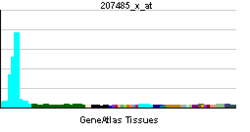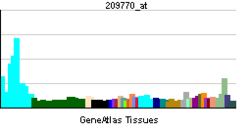Butyrophilin, subfamily 3, member A1
Butyrophilin subfamily 3 member A1 is a protein that in humans is encoded by the BTN3A1 gene.[2][3]
References
- ↑ "Human PubMed Reference:".
- ↑ Ruddy DA, Kronmal GS, Lee VK, Mintier GA, Quintana L, Domingo R Jr, Meyer NC, Irrinki A, McClelland EE, Fullan A, Mapa FA, Moore T, Thomas W, Loeb DB, Harmon C, Tsuchihashi Z, Wolff RK, Schatzman RC, Feder JN (Aug 1997). "A 1.1-Mb transcript map of the hereditary hemochromatosis locus". Genome Res. 7 (5): 441–56. doi:10.1101/gr.7.5.441. PMID 9149941.
- ↑ "Entrez Gene: BTN3A1 butyrophilin, subfamily 3, member A1".
Further reading
- Gerhard DS, Wagner L, Feingold EA, et al. (2004). "The status, quality, and expansion of the NIH full-length cDNA project: the Mammalian Gene Collection (MGC).". Genome Res. 14 (10B): 2121–7. doi:10.1101/gr.2596504. PMC 528928
 . PMID 15489334.
. PMID 15489334.
- Mungall AJ, Palmer SA, Sims SK, et al. (2003). "The DNA sequence and analysis of human chromosome 6.". Nature. 425 (6960): 805–11. doi:10.1038/nature02055. PMID 14574404.
- Strausberg RL, Feingold EA, Grouse LH, et al. (2003). "Generation and initial analysis of more than 15,000 full-length human and mouse cDNA sequences.". Proc. Natl. Acad. Sci. U.S.A. 99 (26): 16899–903. doi:10.1073/pnas.242603899. PMC 139241
 . PMID 12477932.
. PMID 12477932.
- Rhodes DA, Stammers M, Malcherek G, et al. (2001). "The cluster of BTN genes in the extended major histocompatibility complex.". Genomics. 71 (3): 351–62. doi:10.1006/geno.2000.6406. PMID 11170752.
- Tazi-Ahnini R, Henry J, Offer C, et al. (1998). "Cloning, localization, and structure of new members of the butyrophilin gene family in the juxta-telomeric region of the major histocompatibility complex.". Immunogenetics. 47 (1): 55–63. doi:10.1007/s002510050326. PMID 9382921.
- Suzuki Y, Yoshitomo-Nakagawa K, Maruyama K, et al. (1997). "Construction and characterization of a full length-enriched and a 5'-end-enriched cDNA library.". Gene. 200 (1-2): 149–56. doi:10.1016/S0378-1119(97)00411-3. PMID 9373149.
- Maruyama K, Sugano S (1994). "Oligo-capping: a simple method to replace the cap structure of eukaryotic mRNAs with oligoribonucleotides.". Gene. 138 (1-2): 171–4. doi:10.1016/0378-1119(94)90802-8. PMID 8125298.


 . PMID 15489334.
. PMID 15489334. . PMID 12477932.
. PMID 12477932.